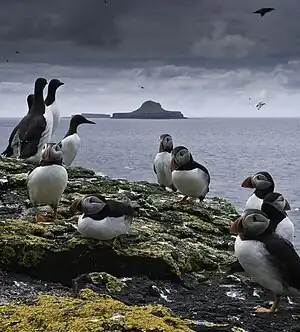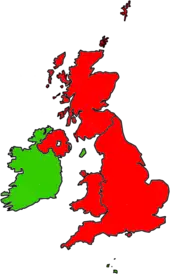| Main Page | Selected articles | Selected biographies | Selected quotes | Selected pictures | Featured Content | Categories & Topics |
Introduction
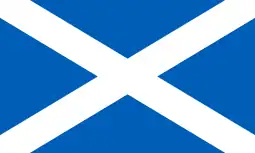 Flag of Scotland |
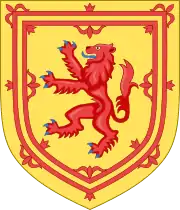 |
|
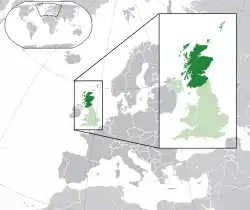 | ||
Scotland (Scots: Scotland; Scottish Gaelic: Alba [ˈal̪ˠapə] ⓘ) is a country that is part of the United Kingdom. It contains nearly one-third of the United Kingdom's land area, consisting of the northern third of the island of Great Britain and more than 790 adjacent islands, principally in the archipelagos of the Hebrides and the Northern Isles. To the south-east Scotland has its only land border, which is 96 miles (154 kilometres) long and shared with England; the country is surrounded by the Atlantic Ocean to the north and west, the North Sea to the north-east and east, and the Irish Sea to the south. The population in 2022 was 5,436,600, and in 2019 Scotland accounted for 8% of the population of the UK. Edinburgh is the capital and Glasgow is the largest of the cities of Scotland.
The Kingdom of Scotland emerged in the 9th century. In 1603, James VI inherited England and Ireland, forming a personal union of the three kingdoms. On 1 May 1707 Scotland and England combined to create the new Kingdom of Great Britain, with the Parliament of Scotland subsumed into the Parliament of Great Britain. In 1999 a Scottish Parliament was re-established, and has devolved authority over many areas of domestic policy. The country has a distinct legal system, educational system, and religious history from the rest of the UK, which have all contributed to the continuation of Scottish culture and national identity within the United Kingdom.
The mainland of Scotland is broadly divided into three regions: the Highlands, a mountainous region in the north and north-west; the Lowlands, a flatter plain across the centre of the country; and the Southern Uplands, a hilly region along the southern border. The Highlands are the most mountainous region of the UK and contain its highest peak, Ben Nevis (1,345 metres (4,413 ft)) The region also contains many lakes, called lochs; the term is also applied to the many saltwater inlets along the country's deeply indented western coastline. The geography of the many islands is varied. Some, such as Mull and Skye, are noted for their mountainous terrain, while the likes of Tiree and Coll are much flatter. (Full article...)
Selected article
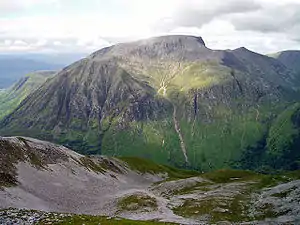
Ben Nevis (/ˈnɛvɪs/ NEV-iss; Scottish Gaelic: Beinn Nibheis, Scottish Gaelic pronunciation: [pe(ɲ) ˈɲivɪʃ]) is the highest mountain in Scotland, the United Kingdom and the British Isles. The summit is 1,345 metres (4,413 ft) above sea level and is the highest land in any direction for 739 kilometres (459 miles). Ben Nevis stands at the western end of the Grampian Mountains in the Highland region of Lochaber, close to the town of Fort William.
The mountain is a popular destination, attracting an estimated 130,000 ascents a year, around three-quarters of which use the Mountain Track from Glen Nevis. The 700-metre (2,300 ft) cliffs of the north face are among the highest in Scotland, providing classic scrambles and rock climbs of all difficulties for climbers and mountaineers. They are also the principal locations in Scotland for ice climbing.
The summit, which is the collapsed dome of an ancient volcano, features the ruins of an observatory which was continuously staffed between 1883 and 1904. The meteorological data collected during this period is still important for understanding Scottish mountain weather. C. T. R. Wilson was inspired to invent the cloud chamber after a period spent working at the observatory. (Full article...) Read more...
Selected quotes
" ... Minds are like parachutes. They only function when they are open ... "
" ... The world is neither Scottish, English, nor Irish, neither French, Dutch, nor Chinese, but human ... "
In the news

- 13 November 2023 – International reactions to the 2023 Israel–Hamas war
- Scottish First Minister Humza Yousaf reiterates his call for an "immediate ceasefire" in the war on Gaza, saying that "children in Gaza don't need a pause in the killing, they need it to stop". (Al Jazeera)
- 3 November 2023 –
- The University of Edinburgh in Scotland, United Kingdom, returns the remains of four Paiwan warriors to the Taiwanese indigenous community, marking the first international repatriation of ancestral remains for Taiwan. The skulls, which the university acquired in 1907 and are believed to have been taken by Japanese forces in 1874, will be housed at the National Museum of Prehistory in Taitung while awaiting a final resting place decision from Mudan authorities. (AFP via The Straits Times)
- 26 October 2023 – 2023 Israel–Hamas war protests
- Fans of Scotland's Celtic Football Club defy their club's directives and wave thousands of Palestinian flags during their team's Champions League match against Atlético Madrid. (Al Jazeera)
- 19 October 2023 – 2023–24 European windstorm season
- Storm Babet impacts the United Kingdom, bringing gale force winds and heavy rains, killing two people in Angus, Scotland, and another person in Shropshire, England. The crew of a Danish fishing trawler is rescued by the RNLI in the North Sea. (BBC News)
- 15 October 2023 – 2023 Israel–Hamas war
- In the United Kingdom, rallies take place in Manchester in Northern England, Edinburgh and Glasgow in Scotland, and London, amid police warnings that support for Hamas could result in arrest. (Al Jazeera)
Selected biography
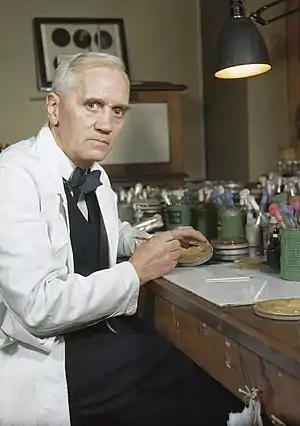
Sir Alexander Fleming FRS FRSE FRCS (6 August 1881 – 11 March 1955) was a Scottish physician and microbiologist, best known for discovering the world's first broadly effective antibiotic substance, which he named penicillin. His discovery in 1928 of what was later named benzylpenicillin (or penicillin G) from the mould Penicillium rubens has been described as the "single greatest victory ever achieved over disease". For this discovery, he shared the Nobel Prize in Physiology or Medicine in 1945 with Howard Florey and Ernst Boris Chain.
He also discovered the enzyme lysozyme from his nasal discharge in 1922, and along with it a bacterium he named Micrococcus lysodeikticus, later renamed Micrococcus luteus.
Fleming was knighted for his scientific achievements in 1944. In 1999, he was named in Time magazine's list of the 100 Most Important People of the 20th century. In 2002, he was chosen in the BBC's television poll for determining the 100 Greatest Britons, and in 2009, he was also voted third "greatest Scot" in an opinion poll conducted by STV, behind only Robert Burns and William Wallace. (Full article...) Read more ...
Selected picture
Did You Know...

- ... that in 1999 two necklaces were repatriated to the Cook Islands National Museum from a museum in Angus, Scotland?
- ... that the South African Pavilion at the 1938 Empire Exhibition in Glasgow became the canteen at an explosives factory?
- ... that Helen Steven shared the Gandhi International Peace Award for her opposition to the nuclear submarine base in Scotland?
- ... that Luke Bond, the organist for a royal wedding and a royal funeral at Windsor Castle, played Poulenc's Organ Concerto in Cape Town?
- ... that after the Battle of Winwick in 1648 some Scottish prisoners were sold as slaves?
- ... that the standard of the late Prince Philip, Duke of Edinburgh, contains references to his status as a former prince of Greece and Denmark, and his title as Duke of Edinburgh?
- ... that John Neilson, a Scottish immigrant to Lower Canada, became a major publisher and bookseller, and was reportedly "the largest consumer of paper" in the country?
- ... that The Much Honoured Catherine Maxwell Stuart, who lives in Scotland's oldest continuously-inhabited stately home, is the first female laird of Traquair?
Get involved
| ||||||||||||||||||||||||||||||
For editor resources and to collaborate with other editors on improving Wikipedia's Scotland-related articles, see WikiProject Scotland.
To get involved in helping to improve Wikipedia's Scotland related content, please consider doing some of the following tasks or joining one or more of the associated Wikiprojects:
- Visit the Scottish Wikipedians' notice board and help to write new Scotland-related articles, and expand and improve existing ones.
- Visit Wikipedia:WikiProject Scotland/Assessment, and help out by assessing unrated Scottish articles.
- Add the Project Banner to Scottish articles around Wikipedia.
- Participate in WikiProject Scotland's Peer Review, including responding to PR requests and nominating Scottish articles.
- Help nominate and select new content for the Scotland portal.
Do you have a question about The Scotland Portal that you can't find the answer to?
Post a question on the Talk Page or consider asking it at the Wikipedia reference desk.
Related portals
Other language versions
Associated Wikimedia
The following Wikimedia Foundation sister projects provide more on this subject:
-
 Commons
Commons
Free media repository -
 Wikibooks
Wikibooks
Free textbooks and manuals -
 Wikidata
Wikidata
Free knowledge base -
 Wikinews
Wikinews
Free-content news -
 Wikiquote
Wikiquote
Collection of quotations -
 Wikisource
Wikisource
Free-content library -
 Wikispecies
Wikispecies
Directory of species -
 Wikiversity
Wikiversity
Free learning tools -
 Wikivoyage
Wikivoyage
Free travel guide -
 Wiktionary
Wiktionary
Dictionary and thesaurus
-
 List of all portalsList of all portals
List of all portalsList of all portals -
 The arts portal
The arts portal -
 Biography portal
Biography portal -
 Current events portal
Current events portal -
 Geography portal
Geography portal -
 History portal
History portal -
 Mathematics portal
Mathematics portal -
 Science portal
Science portal -
 Society portal
Society portal -
 Technology portal
Technology portal -
 Random portalRandom portal
Random portalRandom portal -
 WikiProject PortalsWikiProject Portals
WikiProject PortalsWikiProject Portals
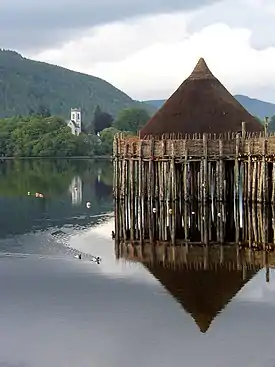
.jpg.webp)
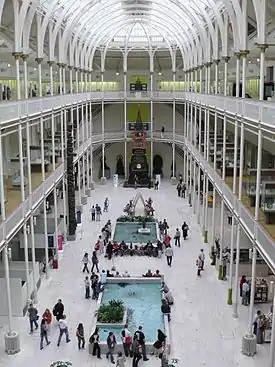
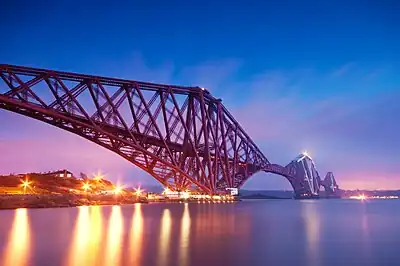

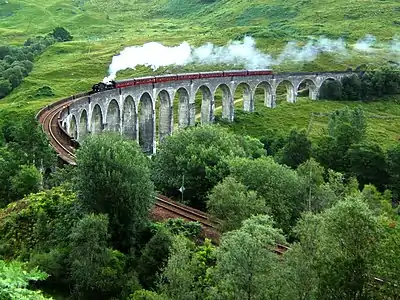
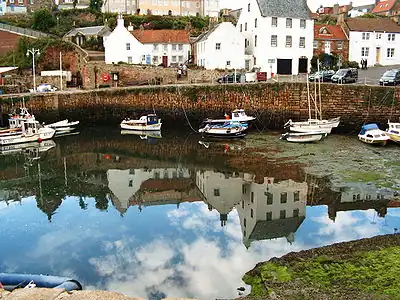
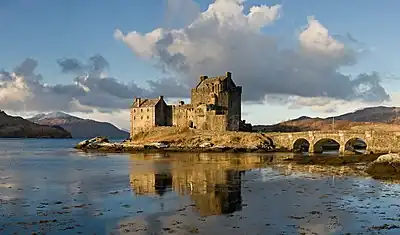
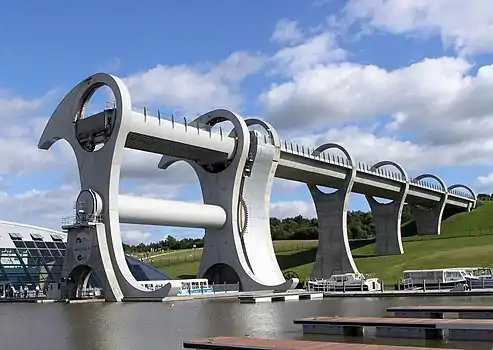
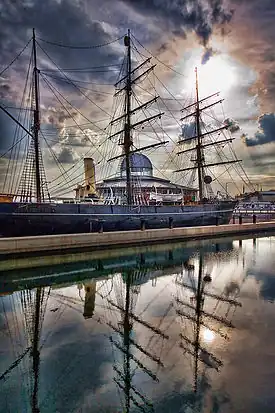


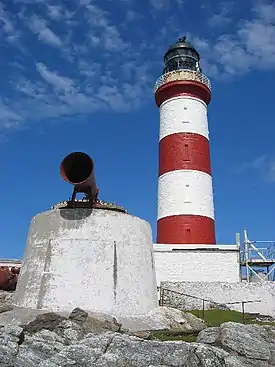

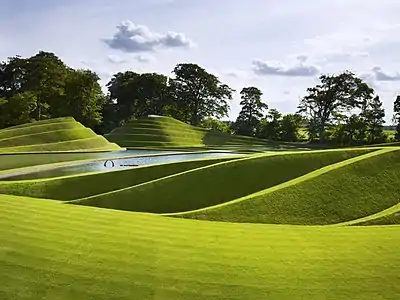
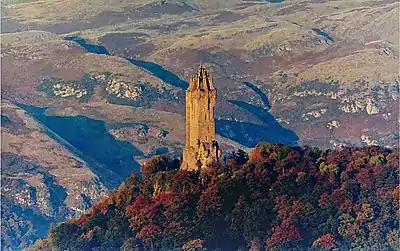
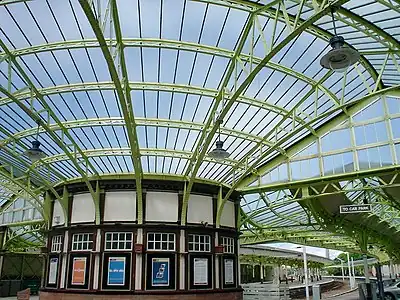
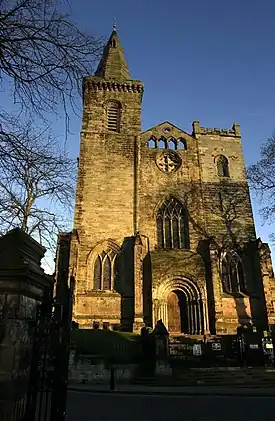
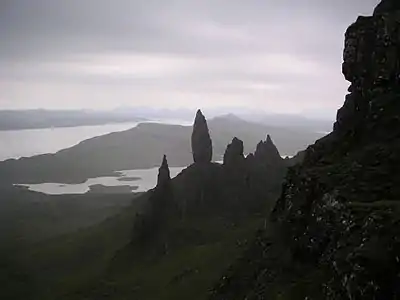
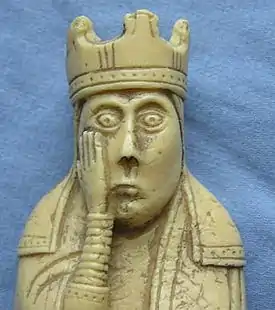
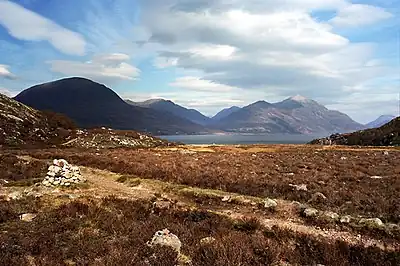
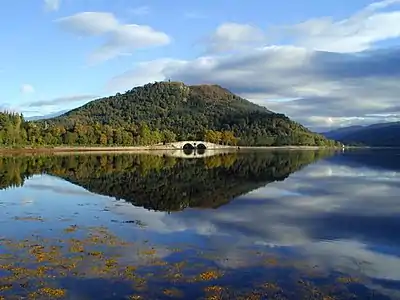
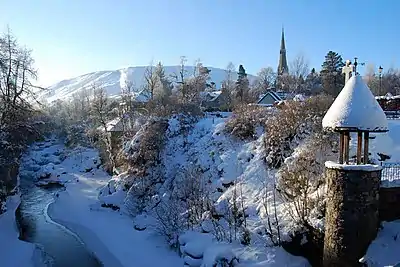
_Skating_on_Duddingston_Loch.jpg.webp)
